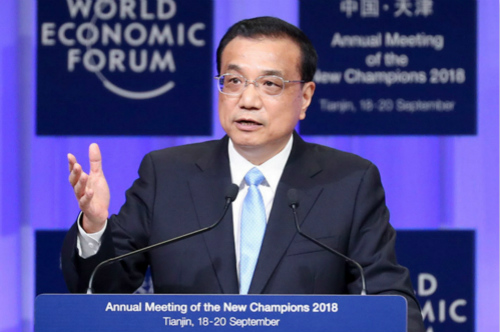
在第十二届夏季达沃斯论坛开幕式上的致辞文章源自英文巴士-https://www.en84.com/5861.html
Address at the Opening Ceremony of the Annual Meeting of the New Champions 2018文章源自英文巴士-https://www.en84.com/5861.html
文章源自英文巴士-https://www.en84.com/5861.html
中华人民共和国国务院总理 李克强文章源自英文巴士-https://www.en84.com/5861.html
H.E. Li Keqiang, Premier of the State Council of the People’s Republic of China文章源自英文巴士-https://www.en84.com/5861.html
文章源自英文巴士-https://www.en84.com/5861.html
2018年9月19日,天津文章源自英文巴士-https://www.en84.com/5861.html
Tianjin, 19 September 2018文章源自英文巴士-https://www.en84.com/5861.html
文章源自英文巴士-https://www.en84.com/5861.html
尊敬的施瓦布主席先生,文章源自英文巴士-https://www.en84.com/5861.html
尊敬的各位元首、政府首脑,
尊敬的各位贵宾,
女士们,先生们:
Professor Klaus Schwab,
Your Excellencies Heads of State and Government,
Distinguished Guests,
Ladies and Gentlemen,
很高兴与大家在天津再次相聚。首先,我谨代表中国政府,对第十二届夏季达沃斯论坛的召开,表示热烈祝贺!对远道而来的各位嘉宾,表示诚挚欢迎!
It is a great pleasure to join you again in Tianjin. Let me begin by extending, on behalf of the Chinese government, warm congratulations on the opening of the Annual Meeting of the New Champions 2018, and a sincere welcome to all guests from afar.
夏季达沃斯论坛成立以来的这些年,正是各方应对国际金融危机、推动世界经济复苏的时期。作为新领军者年会,论坛积极探寻世界经济增长和变革的新路径、新动能,提出了很多前瞻性的真知灼见。令人欣慰的是,在历经艰难曲折之后,世界经济出现整体复苏态势。其中一个重要原因是,新一轮产业革命孕育兴起,全球创新活力竞相迸发,为世界经济发展注入了新动能。然而,当前国际环境中不稳定不确定因素明显增多,逆全球化倾向抬头,怎样继续壮大新动能、促进世界经济持续稳定增长,是各方普遍关心的问题。本届论坛以“在第四次工业革命中打造创新型社会”为主题,具有很强的针对性。
Since its inception years ago, the Summer Davos Forum has borne witness to the efforts by various countries to tackle the global financial crisis and bring about global recovery. As a gathering of new champions in the business community, the Forum has contributed forward-looking insights to the quest for new pathways and engines for global growth and transformation.
It is encouraging to note the collective global recovery that has emerged following a tortuous journey. This recovery is, to a large measure, driven by the new round of industrial revolution and a new boom in innovation, which has lent fresh impetus to global economic development. That said, our world is faced with rising uncertainties and destabilizing factors, and a growing backlash against globalization. How to boost the new drivers to secure sustained growth of the global economy is a key area of concern for all of us. In this context, the theme of this Annual Meeting, “Shaping Innovative Societies in the Fourth Industrial Revolution”, cannot be more relevant.
习近平主席在去年初的世界经济论坛年会主旨演讲中,深刻阐述了中国坚定不移推进经济全球化、维护自由贸易、促进创新驱动等主张。今年是中国改革开放40周年,我们以此为契机,推出了一系列深化改革、扩大开放、推动创新的重大举措。这些是中国自身发展的需要,也是为推动世界经济增长作出的积极努力。
In his keynote speech at the World Economic Forum early last year, President Xi Jinping stated China’s firm commitment to economic globalization, free trade and innovation-driven development. As we mark the 40th anniversary of reform and opening-up in China this year, we have introduced a host of major steps to deepen reform, expand opening-up and advance innovation, aiming to promote both China’s own development and global growth.
在新产业革命中壮大世界经济发展新动能,就要坚定维护经济全球化。新产业革命是在经济全球化条件下产生的,正是全球化带来的贸易和投资自由化、生产和创新要素流动便利化,打造了全球密不可分的产业链、创新链、价值链,推动了新产业革命以前所未有的速度、广度、深度向前发展,形成新技术新产业多点突破、集群发展、爆发增长的态势。在这个进程中,各国经济不同程度融入其中,彼此相互依存、共生共荣。比如,中国货物出口的40%、高技术产品出口的三分之二是在华外资企业实现的。以规则为基础的多边贸易体制,是经济全球化和自由贸易的基石,是实现互利共赢的重要保障,其权威和效力应得到尊重和维护。现行世贸组织的某些规则确有不完善之处,大家可以坐下来平等商量怎么办,但自由贸易等基本原则必须坚持,各方利益关切应得到充分照顾、努力寻求最大公约数。用单边主义的做法是解决不了问题的。在新产业革命中,没有谁能包打天下。各方应优势互补,共育创新、共推创新、共享创新,在严格保护知识产权的基础上,支持企业基于市场原则和商业规则开展创新合作,协力加速新产业革命进程。
To boost the new drivers of global growth, we need to firmly uphold economic globalization, which has provided fertile ground for the new industrial revolution. The liberalization of trade and investment and the free flow of factors of production and innovation that accompanied economic globalization have fostered highly interconnected global industrial, innovation and value chains, and enabled the expansion of the new industrial revolution at a speed, scale and depth unseen before. New technologies and new industries emerged in clusters and grew exponentially, making breakthroughs across a wide range of sectors. Economies around the world got involved in this process to varying degrees, with deepening interconnectedness and interdependence. One case in point is the fact that 40% of China’s exports in goods and two thirds of its high-tech exports came from foreign-invested enterprises in China.
The rules-based multilateral trading system is the bedrock of economic globalization and free trade, and provides important safeguards for win-win outcomes. The authority and efficacy of the system should be respected and protected. Some WTO rules do need to be improved. The right approach is for all to sit down as equals to find solutions. Throughout this process, the fundamental principles of free trade should be upheld, the interests and concerns of all parties be accommodated, and the broadest possible consensus on reform be built up. Taking a unilateralist approach will not solve any problems. As no one can thrive on his own in the new industrial revolution, we must draw on each other’s comparative strengths and act together to nurture and promote innovation for shared benefits. Governments need to support businesses in collaborating on innovation in line with market principles and commercial rules, while fully protecting their intellectual property rights. Greater government-business synergy will facilitate the new industrial revolution.
在新产业革命中壮大世界经济发展新动能,就要增强发展的包容性。与以往产业革命相比,新产业革命具有网络化、平台化、泛在化等特点,降低了准入门槛,为人人参与、人人发展提供了更加平等可及的机会。无论是在城市还是在乡村,每个人都可以借助互联网,更加便利地创业创新创富。我们看到,围绕智能手机的开发应用,衍生出庞大的产业集群,很重要的原因就是千千万万人在开放的平台上,提供了海量的技术解决方案和产业应用方案。把更多的可能变为现实,关键是要营造良好的环境。要健全权利公平、机会公平、规则公平的制度安排,打造平衡普惠的发展模式,发展面向人人的教育,加强对弱势群体的扶持,实现惠及面更广、包容性更强的发展。
To boost the new drivers of global growth in the new industrial revolution, we need to make development more inclusive. Different from previous industrial revolutions, the new round of industrial revolution is enabled by online platforms in a ubiquitously networked environment. Lower thresholds of entry have presented all with an equal and accessible opportunity to participate and benefit. Empowered by the Internet, anyone, no matter in urban or rural areas, can easily start his own business, make innovations and create wealth. As we can see, the development of smart phone applications has spawned massive industrial clusters, as tens of thousands of people upload their technical solutions and industrial application proposals onto open platforms. To turn possibilities into reality, an enabling environment is indispensable. It is imperative to enhance institutional arrangements for equal rights, equal opportunities and fair rules, follow a balanced and inclusive development approach, make education universal, and better support the vulnerable groups so as to achieve more inclusive development that benefits all.
在新产业革命中壮大世界经济发展新动能,就要力促融通创新和发展。新产业革命孕育着无限的希望,自然科学、社会科学、人文艺术等从来没有像今天这样可以深度交织,不同行业、不同企业、不同人群从来没有像今天这样可以深度借力。人工智能集合涵盖了数学算法、仿生科学、传感技术、伦理道德等诸多领域。电子商务也是融通创新和发展的典型,大企业搭建交易平台,中小微企业和商户入驻,对接供给需求两端,联接制造商贸两头,创造了大量新业态、新模式、新就业。我们要顺势而为,推进“互联网+”广泛应用,消除制约要素优化组合的障碍,搭建更多跨领域、跨主体的创新平台,为新动能壮大打开更广空间。
To boost the new drivers of global growth in the new industrial revolution, we need to pursue integrated innovation and development. The new industrial revolution holds out infinite promise. Today, natural sciences, social sciences and liberal arts are deeply entwined as never before. And different sectors, enterprises and communities can leverage each other’s strengths like never before. Artificial intelligence cuts across an array of disciplines such as algorithm, bionics, sensor technology, and ethics.
E-commerce is another example of integrated innovation and development. Transaction platforms, which are set up by big companies and joined by micro, small and medium-sized enterprises as well as individual business owners, have created conditions for the direct matching of supply and demand, production and sales, resulting in a large number of new forms of business, new models and new jobs. We must seize this momentum to promote wider application of the Internet Plus model, clear the hindrance to optimized allocation of production factors, and establish more inter-disciplinary, multi-stakeholder innovation platforms to open up broader space for the development of the new growth drivers.

